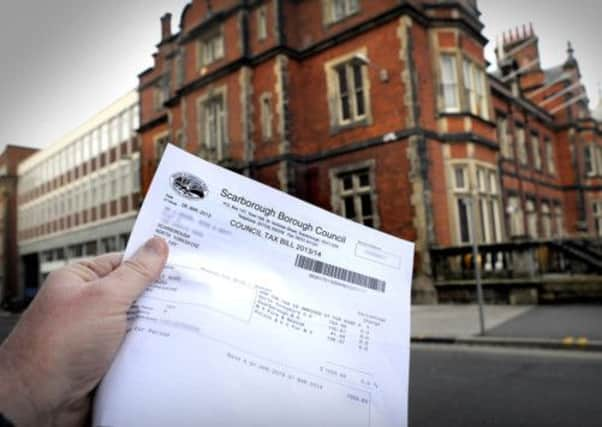Councils reject tax freeze as pressures increase on budgets


This year seven councils across the region chose to increase their bills compared to just two last year.
Before precepts, council tax payers in Wakefield face the highest bills with a band D property charged £1,364.67 while Doncaster boasts the lowest bill at £1,101.71. The average council tax bill, before precepts, for a band D property in Yorkshire now stands at £1,208.41.
Advertisement
Hide AdAdvertisement
Hide AdCurrent forecasts from Yorkshire councils suggest local authorities are already expecting at least a £200m gap in their finances next year, increasing the pressure to raise bills.
The Government has offered extra money, known as the freeze grant, equivalent to a one per cent budget rise to authorities that do not increase council taxes.
But a growing number of council leaders in the region are concerned that coninuing to accept the freeze grant will store up problems for the future.
Because the money offered by the Government is a grant rather than a permanent addition to councils’ base budgets, and the Government looks set on continuing to set limits on rises, more councils are deciding to start increasing their bills now.
Advertisement
Hide AdAdvertisement
Hide AdThe complex way council tax rises are calculated meant Sheffield City Council would only have been able to increase the council tax a fraction before hitting the Government limit.
But Bryan Lodge, cabinet member for finance on Sheffield City Council, said the authority would have liked to increase bills “to protect future funding”.
“The number of authorities taking the freeze grant this year is substantially down on last year, which was down on the year before,” he said.
“The longer you take the freeze grant you are just pushing back the cliff edge you drop off. It is helping people in difficult times but all you are doing is delaying the inevitable.”
Advertisement
Hide AdAdvertisement
Hide AdThe Government has told councils that if they want to raise taxes by more than two per cent they must a hold a referendum.
But councils have been wary of going to the expense of a referendum, particularly in a year when many do not have elections when they could ask the question.
Coun Lodge estimated the cost of holding a stand-alone referendum on council tax increases for the city at around £500,000.
“There is a lot of talk within Government about localising business rates, localising decisions but they won’t allow us to do things that are best for our authority,” he said.
Advertisement
Hide AdAdvertisement
Hide AdNorth Yorkshire County Council chose to freeze council tax for the third year in a move which council leader John Weighell said had saved owners of a band D property £100.
The council is forecasting a £12m gap in its budget next year.
“I think taking the freeze grant does erode the base but it is a question of weighing up what is right for the council and what is right for the public you serve.
“We believe the economy of North Yorkshire will recover more than it has at the moment and at the moment people out there couldn’t afford what would effectively be an extra two per cent rise in the council tax.
Advertisement
Hide AdAdvertisement
Hide Ad“There will come a precipice where you have got to decide enough is enough. Unless some of this money goes into the base you can’t go on forever.
“Other people have made the decision [to raise council tax] on the grounds the council can’t cope any longer.”
Richmondshire and York Councils both put their council taxes up for the second consecutive year at 1.5 and 1.9 per cent respectively. They were this year joined by Bradford, Kirklees, Calderdale, Wakefield and Hull.
The financial year ahead is the third in a row the coalition has offered councils extra funding if they freeze their council tax.
Advertisement
Hide AdAdvertisement
Hide AdThe first year’s deal was an offer of extra money every year until 2015-16 but the second was a grant for one year only. Councils this year have been promised money equivalent to a one per cent rise both this year and next.
The Government is expected to tighten the rules on council tax rises before authorities start setting their budgets for the next financial year.
Part of the council tax calculation comes from levies on councils by bodies such as transport authorities and Local Government Secretary Eric Pickles is expected to alter the rules to ensure they are taken into account.
He has also been highly critical of councils that have raised bills by the full two per cent allowed by the rules.